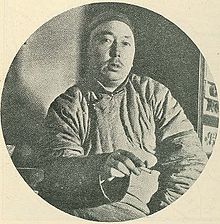Teh Wang
| Demchugdongrub | |
|---|---|
| Дэмчигдонров | |
 |
|
| Chairman of the Mongol Military Government | |
|
In office July 1938 – September 1939 |
|
| Preceded by | Yondonwangchug |
| Succeeded by | Himself |
| Head of state of Mengjiang | |
|
In office September 1939 – August 1945 |
|
| Preceded by | Himself |
| Succeeded by | Position abolished |
| Personal details | |
| Born |
8 February 1902 Sonid Right Banner, Xilingol League, Chahar Province, Qing Empire |
| Died | 23 May 1966 (aged 64) Hohhot, Inner Mongolia Autonomous Region, PRC |
| Nationality | Chinese |
| Occupation | Politician |
| Military service | |
| Allegiance |
|
| Service/branch |
|
| Years of service | 1936–45 |
| Rank | General |
| Commands | Inner Mongolian Army |
| Battles/wars | |
| Demchugdongrub | |||||||||||
| Chinese name | |||||||||||
|---|---|---|---|---|---|---|---|---|---|---|---|
| Traditional Chinese | 德穆楚克棟魯普 | ||||||||||
| Simplified Chinese | 德穆楚克栋鲁普 | ||||||||||
| Literal meaning | Demchugdongrub | ||||||||||
|
|||||||||||
| Abbreviation | |||||||||||
| Chinese | 德王 | ||||||||||
| Literal meaning | Prince De | ||||||||||
|
|||||||||||
| Courtesy name | |||||||||||
| Traditional Chinese | 希賢 | ||||||||||
| Simplified Chinese | 希贤 | ||||||||||
|
|||||||||||
| Mongolian name | |||||||||||
| Mongolian | Дэмчигдонров Дэ Ван |
||||||||||
| Transcriptions | |
|---|---|
| Standard Mandarin | |
| Hanyu Pinyin | Démùchǔkèdònglǔpǔ |
| Wade–Giles | Te2-mu4-ch'u3-k'e4-tung4-lu3-p'u3 |
| IPA | [tɤ̌mûʈʂʰùkʰɤ̂tʊ̂ŋlùpʰù] |
| Transcriptions | |
|---|---|
| Standard Mandarin | |
| Hanyu Pinyin | Dé Wáng |
| Wade–Giles | Te2 Wang2 |
| Transcriptions | |
|---|---|
| Standard Mandarin | |
| Hanyu Pinyin | Xīxián |
| Wade–Giles | Hsi1-hsien2 |
Demchugdongrub (Mongolian Cyrillic: Дэмчигдонров, Mongolian Traditional script: ᠳᠡᠮᠴᠦᠭᠳᠥᠨᠷᠥᠪ Demčugdongrub, Chinese: 德穆楚克栋鲁普; 8 February 1902 – 23 May 1966), commonly known as Teh Wang or De Wang (Дэ Ван), was a Mongolian prince descended from the Borjigin imperial clan who lived during the 20th century and became the leader of an independence movement in Inner Mongolia. He was most notable for being the chairman of the pro-Japanese Mongol Military Government (1938–39) and later of the puppet state of Mengjiang (1939–45), during the Second Sino-Japanese War. In modern day, some see Demchugdongrub as a Mongol nationalist promoting Pan-Mongolism while others view him as a traitor and as the pawn of the Japanese during World War II.
A Chahar born into the Plain White Banner in Chahar Province of the Qing dynasty, Demchugdongrub was the sole son of Namjil Wangchuk, the Duoluo Duling Junwang (多罗杜棱郡王 Duōluō Dùléng Jùnwáng) of Sönid Right Banner and Chief of the Xilingol League. His name consists of the Tibetan words "Chakrasamvara" (Wylie: bde mchog) and "Siddhartha" (Wylie: don grub) respectively.
...
Wikipedia
